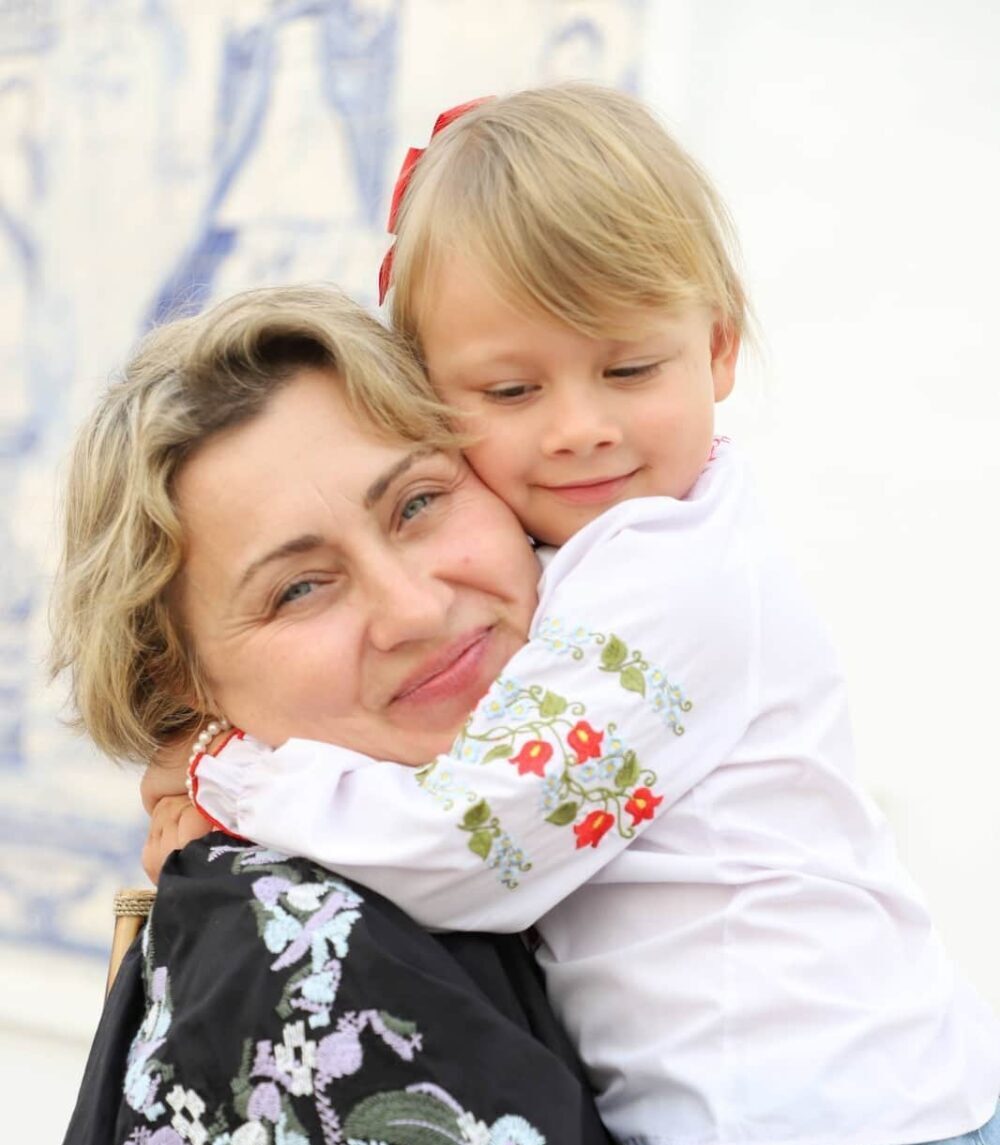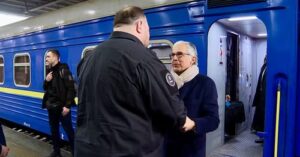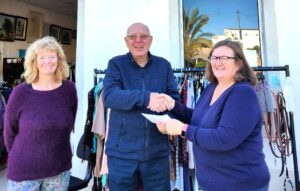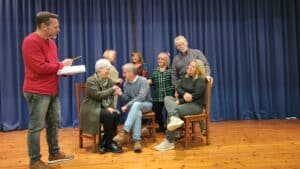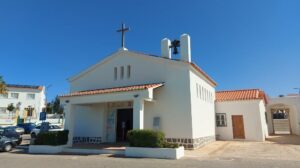In an honest, motivational interview, journalist Mário Silva Monteiro speaks to Nataliia Korzh, a Ukrainian woman living in Portugal who inspires people to pursue their dreams, no matter how grand and intangible they may seem.
Today, I met a person who resembles a painting crafted with many brushes, where every stroke is a story, an emotion, or a scent. Nataliia Korzh, a filmmaker, psychologist, president of the VARTA Association (a Portuguese association supporting communities impacted by war), is a woman building the “City of the Happy” in Portugal. Her energy is as open and powerful as an ocean breeze at sunset.
“They call me Nata,” she laughs. “My friends joked that, since I love pastel de nata (Portuguese custard tart), that’s who I should be – Nata.” And in that moment, I realized that my conversation partner today is more than a name or a profession – she is a philosophy of life: to always start with a blank slate, even when the future is uncertain.
From the very first minutes, she started asking me questions instead of the other way around. This isn’t just an interview, it’s a journey between light and shadow, between memories, scents, and dreams of the future.
Mário Silva Monteiro: Where should we begin, Nata? Is that the name you chose for Portugal?
Nataliia Korzh: You might say that’s my name, unofficially. My friends came up with it: “If you love pastel de nata, then you’ll be Nata.” And that’s what they call me.
So, about beginnings. Today, as I stared at a blank sheet of paper, for a moment, my heart froze. “Is it all starting over?” I experienced a wave of emotions – a morning cocktail mixed with fear, uncertainty, hesitation, yet also thirst and curiosity. The thought that pushed me to taste this cocktail was: this untouched white canvas is a land no one else has walked on yet – here and now, I am a pioneer.

And so, every day, I begin again. Not entirely from the beginning because there is much to remember – though, as we say, not everything is fit to tell the children. I always tell my kids, “Don’t tire of trying. One of those attempts will lead to happiness.” Sometimes it’s crushingly hard, but we know the goal, and we believe it’s achievable. At some point, no extraordinary effort or patience will be needed – it will simply happen. You will feel its taste, its scent, and the warmth on your skin because it is so close. Right here. (She touched her heart, reached out and brushed my hand, and then, locking her piercing blue gaze with mine, she finished after a pause) And here it is, already in front of my eyes.
(I was taken aback by her energy — so open, so powerful, like a gust of wind off the sea. For a moment, I felt her strength)
N.K.: I’ve been a dreamer since birth. By profession, I’m a filmmaker; by nature, I’m a creative provocateur. I lean toward art and expanding the consciousness of my interlocutor.
Let’s experiment. If you don’t mind, I’ll ask you three questions – questions that are vital in my life and which, sometimes, when answered, turn life upside down. You’ve probably never thought about them because there’s never been time. We’re all bound to routine tasks, living on a schedule.
M.S.M.: Shall we try?
N.K.: Remember a moment in your life when you were completely happy, to the point of goosebumps. What did you see, hear, and feel then? Was there a particular scent that still brings you back to that moment?
M.S.M.: (laughs) That’s a clever trick – I’m supposed to ask you the questions, not the other way around. Fine! I know that moment. But as for you – isn’t that question too personal?
N.K.: You know, I remember those moments vividly, even through scents. The first was when I was a child, and my mother took me to the Aidar River (Luhansk region). Our family house sat on the riverbank, surrounded by a sprawling apple orchard tended by my grandparents, grapevines, and a vast millet field. That scent – fresh-cut grass and my childhood – still lingers.
We were wading in the water when I squatted down, dove under, and my mother, who couldn’t swim, panicked and let go of my hand. I saw her from underwater, terrified and calling for help, but I wasn’t scared. I felt calm, cozy. When they pulled me out, my mother cried, and I wiped her tears, saying, “I can swim, Mama!” Now I can swim even in the ocean.
The Luhansk region is closed to me now. I can’t return to the family estate or visit the cemetery to mourn and remember everything.

Another vivid memory is the birth of my children. My daughter Anya was born in winter, and the air smelled of snow. Outside the window, a streetlight glowed, and the delivery room was freezing. Time moved so slowly, and my newborn cried as I lay unable to move or comfort her. When a nurse came, I asked for a blanket. As she covered me, I promised to name my daughter after her – Anna. And now, my Anya is my symbol of care and kindness.
You see, all the fleeting yet significant moments in life have a scent. And from those moments, my soul is made.
M.S.M.: (smiling) You’re extraordinary. I didn’t expect such details. What does this new country, Portugal, smell like to you?
N.K.: You know, I love driving at sunset. It feels sacred to me. As a filmmaker, I’ve worked in many countries, often arriving in the evening. Every country initially smells like ‘the weariness of a day well spent’ – slightly sun-tired. Portugal, more than anywhere else, captures that. It’s peace, a slow sunset, and Mediterranean dishes – grilled dourada and the intoxicating scent of blooming orange trees. When I arrived in 2022, I was stunned to see those trees both flowering and fruiting simultaneously. It’s a miracle of nature, and the scent … it’s worth a million.
M.S.M.: In which countries have you been, and what scents can you recall?”
N.K.: In Turkey, it’s the aroma of apple tea, the scent of saffron, freshly-baked baklava, and lavash. A light salty breeze mixes with spicy notes of cinnamon and pomegranate juice.
When the sun sets in Azerbaijan, the air fills with the smoky aroma of a mangal, where juicy kebabs and vegetables are being grilled.
In Germany, there’s the smell of freshly-baked bread mingling with the crisp scent of pine. Of course, the traditional festival atmosphere is unmistakable – the aroma of sausages with mustard, the smell of fresh herbs, and the damp, ancient cobblestones.
In France, I’ve only been to Colmar, where the first sketch of the Statue of Liberty was drawn. Interestingly, it wasn’t born in America but there. For some reason, the air smelled of poplar resin from the leaves – you know, it’s unforgettable – and coffee. As I recall it now, a movie unfolds in my mind: the streets, the people, the music – everything appears like vivid three-dimensional images.

M.S.M.: Listen, can I ask you candidly about another country? You know which one I mean. You’ve been there – what does it smell like?
N.K.: I was there long before the first war. I worked with CBN, and we filmed in both Moscow and St. Petersburg. I even lived in Dostoevsky’s apartment, where he wrote his novel The Gambler. It felt eerie and mystical. I constantly sensed a cold atmosphere, a persistent dampness, and everything was always gray – there wasn’t enough sunlight. Subconsciously, it felt cold, teetering on fear. Perhaps that is the smell of death. I don’t know.
M.S.M.: You’re talking about death. Are you okay? Can we continue?
N.K.: Death … It’s something we encounter often now. The Grim Reaper cuts down my people, if we’re talking about Ukraine. It’s genocide. If the first murder described in the Bible was Cain and Abel, we’ve long known that humans are capable of killing their brother over a bowl of lentil stew, losing their birthright – their dignity and soul.
Seeing this firsthand is terrifying. It’s like reading the Old Testament and seeing the illustrations play out in real life. So many of my friends have died in this war – poets, writers, colleagues in journalism, soldiers, and ordinary civilians. They never finished writing their books or had the chance to bring children into the world. This is the bitter truth.
We weren’t preparing for war; we were building our future. Now, a third of Ukrainians are scattered across the globe, and no one knows when we’ll lay tables with white tablecloths under the apple orchards of our ancestors and raise a glass to the living and the dead. Because now, we are all boiling in the same cauldron of a great transformation.
M.S.M.: I want to ask you something else. Imagine you’re standing in front of a mirror, but it doesn’t show your reflection. Instead, it reveals your achievements and deepest desires. What do you see in that mirror? What surprises you, and what makes you cry from pride or sorrow?
N.K.: It’s hard to answer briefly. It’s like standing before a portal, and you need to be completely honest, transparent, and believing.
When I arrived in 2022 with my children, I was saving their lives. Then came the moment when you either adapt or assimilate into society. My daughter and I began filming everything happening around us, recording people’s stories. We wanted to create a digest about Ukrainians scattered across different countries.

We filmed the first episode (my daughter is my colleague, and we even graduated from the same film and theater university, Karpenko-Kary, just at different times). Back home in Ukraine, we won grants to create more. We thought it would be faster and easier in Europe. But after presenting the film “Olá do paraíso”, we applied for funding, and because the film was already complete, we showed it at festivals, and that’s where it ended.
So, this is the path we follow – people applaud at presentations and expect us to achieve everything on our own.
We registered ‘VARTA Associação Portuguesa para as Comunidades em Conflitos de Guerra’, uniting migrants, and for three years now, we’ve showcased our accomplishments at festivals in Lagoa. We developed a 10-year strategic plan and designed around 30 to 40 projects ready to be implemented – but still, there are only promises of “amanhã, amanhã”.
What gives me goosebumps? Our strategic goal – to build the “City of the Happy” with a tactile zoo where people can connect closely with animals. A smart city with rehabilitation quarters and Creative Development Centers featuring innovative technologies, populated by people with a new, progressive understanding of the world, shared values, and harmony.

We’ve planned a “Stork’s Nest” center for migrants of all nationalities, where they can gather, speak their own languages, and feel seen and valued. Attached to it is the “Escada” school with the summer camp “Caminho para a Felicidade” and the psychotherapy office “Psicoterapia. Conversas da Alma”.
These projects, every one of them has its own unique, authorial touch.
We even created “Cinema-Burger Sobre Rodas” – a traveling cinema and burger shop to promote cinema and build an international intellectual community. This will grow into an annual film festival “É inesquecível”, with a village that transforms based on the cultural traditions of the country whose films are showcased that year.
And we’ve launched the “Dia Internacional da Vyshyvanka. Sem Fronteiras” – a celebration of embroidered clothing that fuses ancient traditions with modern fashion.

Finally, at the Algarve’s largest festival, FATACIL, we plan to present Sorochynsky Fair, a space resembling a museum of ancient crafts from different countries, complete with a Cossack Sich and so much more.
You know, when people see how our ancestors lived similarly despite being in different geographical regions, they might realize how much we share. When a Portuguese potter and a Ukrainian potter work side by side, they will find a common language. And perhaps, through this, we will achieve peace and harmony on Earth faster.
M.S.M.: That’s incredible work. Do you see this as your mission?
N.K.: To unite and inspire. To believe in fairy tales and miracles, and to work tirelessly, every day, until happiness is achieved.
We are the keepers of something vital – the knowledge of our people, the essence encoded in our genes. We cannot dissolve and forget who we are and why we were born.
The future doesn’t belong to countries; it transcends borders. It belongs to ‘Cities of the Happy’, where thoughts aren’t about taking what isn’t yours but about evolving as souls and as a species, so we aren’t destroyed or forgotten.
If anyone wishes to support the brave and create a better future together, we are always open.

Conclusion
“The future isn’t just a map of borders and nations,” Nataliia says. “It’s cities where happy people live, in harmony with each other and the world.”
Her projects aren’t just plans on paper; they’re tangible solutions for uniting cultures and building communities where everyone feels seen and valued. From “The Stork’s Nest” to the “Escada” school, from the Cossack Sich at FATACIL to the International Vyshyvanka Festival.
Listening to Nataliia, I realized that it is people like her who make the world better – those who aren’t afraid of a grand dream because they take small steps toward it every day. And you know, her words – like the scent of blooming Portuguese orange trees – stay with you long after she’s gone.
“Don’t tire of trying. One of those attempts will lead you to happiness.”
By MÁRIO SILVA MONTEIRO
—————————————————-
About VARTA
VARTA stands for ‘Associação Portuguesa para as Comunidades em Conflitos de Guerra’. For over three years, the organization has been working in Portugal, providing support to people displaced from war zones. It implements unique projects in the fields of rehabilitation, education, and creative development.
The key project of the association is the creation of an innovative rehabilitation quarter within the concept of the “City of Happiness”. It will include a contact zoo, an authentic settlement, and housing for qualified professionals working with people who have experienced traumatic events. This project aims to help orphans, military veterans, and single mothers find harmony, inspiration, and a new sense of purpose through the assistance of rehabilitation specialists, caregivers, artists, and psychologists.


